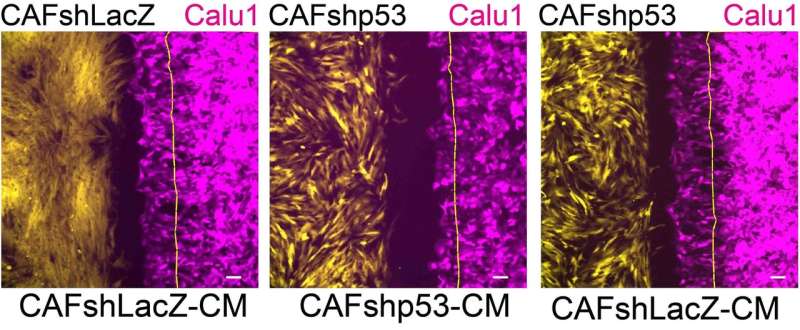Switching sides: The betrayal of an anti-cancer gene

It doesn't often happen that army generals switch sides in the middle of a war, but when cancer's attack is underway, it may even cause a gene that acts as the body's master defender to change allegiance. As reported recently in the Proceedings of the National Academy of Sciences (PNAS), researchers at the Weizmann Institute of Science have discovered that the betrayal of this gene can occur in more ways than previously appreciated.
All cells carry this gene, known as p53. This gene normally plays a central role in protecting the body against malignancy, orchestrating the cell's defenses against cancer and often killing a potentially cancerous cell if these fail. In about half of cancer patients, the p53 gene within the cancerous cells contains alterations—mutations—that can result in the production of a p53 protein that not only fails to suppress cancer, but can even launch cancer-promoting activities.
But besides the cancerous cells, a malignant tumor contains a variety of non-cancerous cells and connective tissue elements, commonly referred to as the tumor microenvironment. In the initial stages of cancer development, the microenvironment is hostile to the tumor. Prof. Moshe Oren of the Molecular Cell Biology Department and other scientists found in earlier studies that the p53 of the microenvironment cells contributes to this hostility, blocking the spread of the cancer. "This protective campaign probably often succeeds, otherwise people would get cancer much more frequently than they actually do," says Oren.
As the cancer progresses and becomes more malignant, the tumor microenvironment gradually changes. Scientists refer to this process as "education": The microenvironment is being co-opted by the progressing tumor into promoting, rather than restricting, the cancer.
Among the co-opted cells are the fibroblasts, which supply the tissue with structural "cement." Initially these help recruit immune cells against the cancer, but they now start releasing substances that encourage tumor growth, invasion and survival. At this stage, these cells are referred to as cancer-associated fibroblasts.
The new study, conducted in Oren's lab in collaboration with Weizmann Institute colleagues, shows that the microenvironment's "education—a more appropriate term would probably be "brainwashing—is directed in part at the fibroblasts' p53. As the cancer grows, the p53 in the fibroblasts switches sides. Although the p53 in the cancer-associated fibroblasts doesn't acquire mutations as it does in the cancer cells, it nevertheless becomes altered in a manner that causes it to switch from restricting to supporting the cancer.
In the study, led by postdoctoral fellow Dr. Sharath Chandra Arandkar, in collaboration with departmental colleague Prof. Benjamin Geiger, and with Prof. Yosef Yarden and Dr. Igor Ulitsky of the Biological Regulation Department, the researchers showed that eliminating the p53 protein from cancer-associated fibroblasts by silencing their p53 genes caused these cells to lose many of their tumor-supporting features and behave more like normal fibroblasts. In particular, the silencing of fibroblast p53 reduced the migration of adjacent cancer cells in a laboratory dish—a crucial change, considering that invasive migration facilitates the metastatic spread of cancer. Moreover, the silencing of p53 in cancer-associated fibroblasts greatly reduced the ability of these cells to promote tumor growth in mice.
Study authors included Weizmann's Drs. Noa Furth, Yair Elisha and Nishanth Belugali Nataraj, and, from Dr. Margarete Fischer-Bosch Institute of Clinical Pharmacology in Stuttgart, Germany: Prof. Walter Aulitzky and the late Dr. Heiko van der Kuip, to whose memory this publication was dedicated.
Finding ways to "re-educate" the renegade p53 in the tumor microenvironment—to reverse its behavior back to suppressing tumors—may pave the way to the development of novel therapies that will target the microenvironment rather than the cancer cells themselves. Indeed, strategies targeting the cancer microenvironment are being increasingly explored in recent years. The hope is that they might provide a new window of opportunity for launching effective therapy, because the microenvironment tends to evolve more slowly than the mutation-ridden tumor cells. Cancer and it's microenvironment: Time lapse movie of GFP-expressing immortalized NFshLacZ cells from patient 4731 (Yellow) and mCherry-expressing Calu1 cells (magenta). Cells were seeded in 12-well plates containing ibidi culture inserts. The next day, inserts were removed and cells were allowed to migrate. Images were captured every 15 min, for a total of 6 h
More information: Sharathchandra Arandkar et al. Altered p53 functionality in cancer-associated fibroblasts contributes to their cancer-supporting features, Proceedings of the National Academy of Sciences (2018). DOI: 10.1073/pnas.1719076115




















